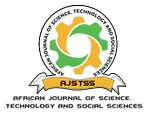Publication ethics
Publication Ethics and Integrity Policy
The African Journal of Science, Technology and Social Sciences (AJSTSS) upholds the highest standards of ethical behavior and integrity in publishing. These standards ensure the credibility of published work, trust in scientific communication, and appropriate recognition of scholarly contributions. The journal is committed to the Core Practices and Code of Conduct established by the Committee on Publication Ethics (COPE).
1. Article Assessment and Peer Review
-
Editorial Screening: All submitted manuscripts are first assessed by the Editor-in-Chief to ensure they meet the journal’s scope and basic quality standards.
-
Peer Review: Submissions that pass the initial screening undergo double-blind peer review. Reviewer identities remain confidential to the authors.
-
Expert Advice: For manuscripts with ethical, security, or societal implications, external expert input may be sought in addition to regular review.
2. Plagiarism and Misuse of Sources
-
Authors must clearly attribute all sources and ideas. Unattributed use of others’ work, including text, figures, or data, constitutes plagiarism.
-
All submissions are screened using plagiarism detection software.
-
Acceptable similarity index: ≤ 15% overall.
-
No more than 30% from any single source.
-
-
Plagiarized manuscripts will be rejected, and authors may face sanctions. If plagiarism is identified post-publication, the article may be corrected or retracted.
3. Duplicate Submission and Redundant Publication
-
Manuscripts must be original and not previously published in any language or submitted simultaneously to other journals.
-
Work shared in theses, institutional repositories, or preprint servers will be considered, but must be transparently declared.
-
Authors must cite and differentiate any previously published or under-review work that has contributed to the new manuscript.
4. Corrections, Retractions, and Editorial Responsibility
-
Corrections:
-
Errata will be issued for errors introduced by the publisher.
-
Corrigenda will be published for author errors.
-
-
Retractions will be issued for:
-
Proven misconduct (e.g. plagiarism, falsification).
-
Major errors invalidating research findings.
-
-
Expressions of Concern may be issued pending investigation.
-
All correction/retraction notices will be transparent and require approval from all authors and, where necessary, their institutions.
5. Author Responsibility
-
Authors must:
-
Ensure the authenticity and originality of their work.
-
Provide accurate data and methodology.
-
Appropriately credit all co-authors and contributors.
-
Disclose any conflicts of interest.
-
-
The corresponding author is responsible for communicating with the journal and ensuring all co-authors agree to the submission and final publication.
6. Editorial and Reviewer Ethics
-
Editors and reviewers must:
-
Maintain confidentiality of submissions.
-
Avoid conflicts of interest.
-
Provide objective, constructive, and timely feedback.
-
Not use submitted content for personal or professional gain.
-
-
Editors must ensure that all decisions are made without bias, in line with the journal’s ethical standards.
7. Sanctions
AJSTSS reserves the right to impose sanctions on authors, editors, or reviewers found to have violated ethical standards. These may include:
-
Manuscript rejection or retraction.
-
Notification of institutional misconduct committees.
-
Temporary or permanent submission bans.
8. Ethical Oversight and COPE Alignment
AJSTSS is committed to ethical transparency and follows COPE’s principles for handling:
-
Allegations of misconduct.
-
Data integrity issues.
-
Peer review manipulation.
-
Editorial conflict of interest.
We continuously evaluate and update our policies to reflect evolving best practices in scholarly publishing.

